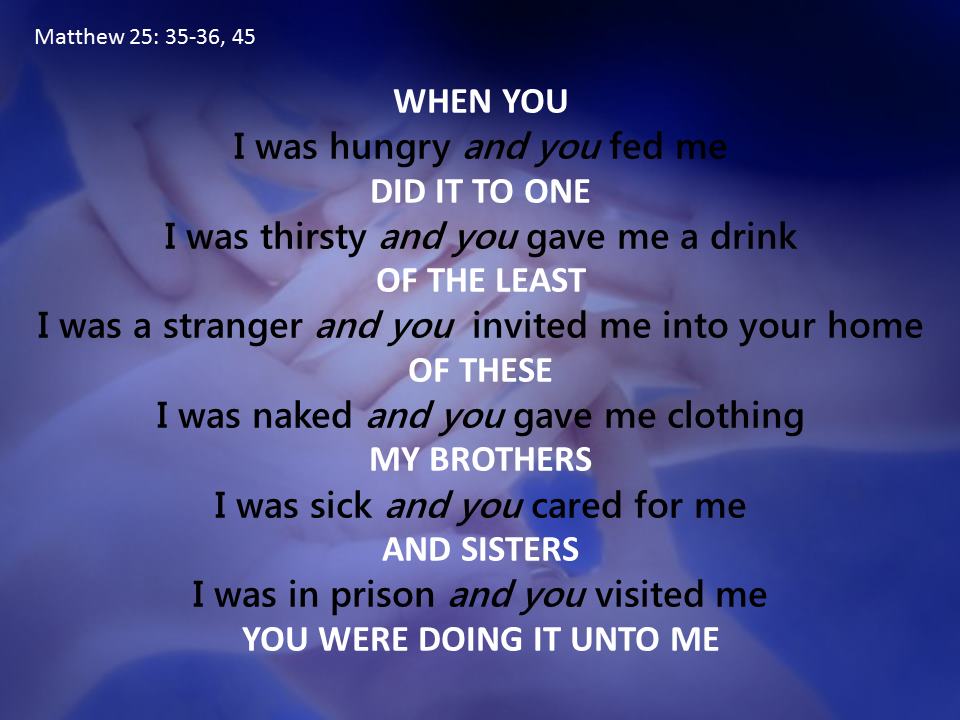The Day of Judgement (How to be ready)

Wouldn’t it be nice to sit a test or examination and actually know in advance what the questions will be?
When I worked as a teacher in a Christian rehab, the guys that I taught had to sit tests at the end of each subject that they studied. I nearly always gave them some revision questions and they knew that these subjects would invariably be in the actual test. They still had to do the work of learning but now they could focus their work on the things that really mattered in order to pass the test. Coincidentally, these were also the key things that we were encouraging them to learn and put into practice.
So what has this got to do with The Day of Judgement? Well, the Lord has graciously and kindly told us in advance as to what we should expect in the ultimate examination we all must face and that is when we have to face the Lord Jesus Christ on The Day of Judgement to give an account to Him for our lives. If we carefully study the bible, we will see that it’s all there for us and so we shouldn’t be caught out by what He expected of us.
Before we go on to examine some of the key verses in the bible that should get us prepared to do well at the Day of Judgement, I believe that we have to really understand a key principle that will then help us make sense of some of the parables or analogies the Jesus uses.
The bible clearly states that it is by grace, through faith that we have been saved, and this is not from yourselves but a gift from God, not by works so that no one can boast. (Ephesians 2:8-9).
Salvation can only be obtained through faith and no amount of good works, without faith, will save us.
But saving faith can be likened unto a coin, in that it has two sides to it and you need both sides otherwise it’s not either a genuine coin or genuine salvation.

So, what is the other side of the ‘salvation coin’ if the first side is faith? Well, let’s look at these verses:
What good is it, my brothers and sisters, if someone claims to have faith but has no deeds? Can such faith save them? Suppose a brother or a sister is without clothes and daily food. If one of you says to them, “Go in peace; keep warm and well fed,” but does nothing about their physical needs, what good is it? In the same way, faith by itself, if it is not accompanied by action, is dead.
But someone will say, “You have faith; I have deeds.”
Show me your faith without deeds, and I will show you my faith by my deeds. You believe that there is one God. Good! Even the demons believe that—and shudder.
You foolish person, do you want evidence that faith without deeds is useless? Was not our father Abraham considered righteous for what he did when he offered his son Isaac on the altar? You see that his faith and his actions were working together, and his faith was made complete by what he did. And the scripture was fulfilled that says, “Abraham believed God, and it was credited to him as righteousness,” and he was called God’s friend. You see that a person is considered righteous by what they do and not by faith alone.
In the same way, was not even Rahab the prostitute considered righteous for what she did when she gave lodging to the spies and sent them off in a different direction? As the body without the spirit is dead, so faith without deeds is dead. James 2:14-26
What this is saying is that genuine faith will be proved by the works that it produces. Remember when we looked at the subject of Repentance and discovered that genuine repentance will produce subsequent fruits of repentance.
Putting it another way, if you were having to face a judge because you were accused of being a Christian, would there be enough evidence to convict you?
There has to be a noticeable difference before and after your conversion experience. Just consider one example from the bible; remember how Paul (formerly called Saul) went about killing Christians before his salvation experience and then see the remarkable transformation after! He went on to write nearly half of the New Testament, he spent his remaining life proclaiming Christ and suffering horrendously for it and ultimately was killed for doing it. Look also at a very important attitude change that took place immediately after his conversion when he demonstrated that he really did believe that Jesus was his lord when he asked Him, “Lord, what do you want me to do?” (Acts 22:10)
We saw how important faith is for salvation in Ephesians 2:8-9 but look what it goes on to say about works in the very next verse, ‘For we are God’s handiwork, created in Christ Jesus to do good works, which God prepared in advance for us to do.’ (Ephesians 2:10). Can you see that? God has prepared good works for us to do. Salvation should always result in good works.
If we really comprehend this basic test of genuine faith, then we will understand and not be perplexed as to why certain people, will be thrown together with unbelievers into the lake of fire.
The Judgement Predicted in the Old Testament:
1 Chronicles 16:33
Psalm 9:7
Psalm 96:13
Ecclesiastes 3:17
Here are some verses that tell us to expect a final judgement in the New Testament:
So then, each of us will give an account of himself to God. (Romans 14:12)
For we must all appear before the judgement seat of Christ, so that each of us may receive what is due to us for the things done while in the body, whether good or bad.(2 Corinthians 5:10)
Jesus will return to judge the living and the dead. (Matthew 24:29-3)
People are destined to die once and after that to face judgement. (Hebrews 9:27)
The Judgement of the dead. (Revelation 20:11-15)
How can we get ready for Judgement Day?
Do not be surprised at the coming of the Lord, but be ready.
Matthew 24:36-44, Luke 17:26-27
The point that Jesus is making is that the day and hour of His return is unknown. Also, when He does return it will be just like any other day; it will be a normal kind of a day. Jesus cites the case of the flood in Noah’s day. Only Noah was actually getting ready. For all the others, it was just ‘business as usual’. People were doing what people normally do; they were eating and drinking, getting married and arranging to get married. Men were working in the field and women were grinding out flour. People were just doing the same as they had always been doing but then suddenly the flood came and they were all wiped out.
Jesus also uses an analogy of a thief breaking into someone’s house at night. The point that the Lord is making is that if the owner of the house knew someone was going to break in, then they would be looking out for the thief and would therefore be able to prevent the robbery. The point is clear; be ready.
Therefore, Jesus warns us not to get caught out when He returns but to keep watch.
Wait for the Lord as steward’s who must give an account, faithful or otherwise.
Matthew 24:45-51
These next verses build upon the point Jesus is making about being ready and not surprised by His return. We have already discovered that the day and hour are not known, but here we are warned to always be faithful even if it may be a long time (Vs.48).
Slavery was very common in biblical times. Therefore, Jesus uses an illustration using a slave master situation to make His point. Clearly, this point is being made to people who the ‘master’ has put in charge to feed all the other slaves at the proper time. Jesus is the ‘master’ and we (all believers) are the ‘slaves’. Now, the crucial part is to know who is the one that has been put in charge (the steward) to feed the other slaves? Well, obviously, that would appear to be meant for pastor’s and teachers who are supposed to feed God’s people from the Word of God. However, one can widen this responsibility to any person who is in a position to instruct and teach God’s people. This may include parents, Sunday school teachers and husbands who are responsible for the spiritual wellbeing of their wives. It could also be applied to a person who is discipling another believer.
Now things move up to a whole new level of seriousness and the consequences become very grave indeed. Because, Jesus states that if the person meant to be doing the feeding doesn’t (because it seems like the master will never return), but then actually abuses the other servants and they themselves start getting drunk and being in places they know they shouldn’t then, in short, they will be sent to hell for their hypocrisy. This is clearly a very stark warning to people who call themselves pastors but are really just fleecing ‘their flock’ and they themselves are ensnared by the depravity of sin.
Rather than finish this section on a sombre note, it would be good to reflect on the promised reward for the faithful steward and really this is quite exceptional and unprecedented. A slave would not normally be put in charge of all the owner’s possessions. However, Jesus said that the faithful steward would be put in charge of all the master’s possessions (Vs.47); what wonderful rewards await those of us who are faithful!
Wait for the Lord Jesus as though His return is long delayed.
Matthew 25:1-13 – The Parable of the Ten Virgins
Search the Internet and you will find such a wide variety of interpretations for this. It would seem fairly obvious that a background knowledge of the marriage arrangements at this time would be an ideal place to start but again, it’s very difficult to get a clear picture because of so many different opinions. So, what we are going to do is really just look at the facts as they are presented to us in these verses and my hope is that the conclusions drawn out are clearly seen to be both very simple and what we learn is that it is a clear message for us today and a warning for us to be doing what the Lord wants us to be doing, immediately prior to and be found doing upon His return.
The job assigned to the virgins is clear; they are to go out and meet the bridegroom and all ten took their lamps with them. The difference between them is that the five wise one’s took jars of oil with them in case the bridegroom was long delayed. The foolish one’s only had the oil that was in their lamps already. This is also borne out by what happened in verses 7 & 8 where all ten virgins trim their lamps but those of the foolish one’s started to go out as the oil ran out. So, straight away, you see very different attitudes; the five foolish one’s were pretty half hearted and showed very little commitment to the task at hand. The wise one’s on the other hand showed dedication and had even invested in extra oil just in case; it had been more costly for them.
Verse 5 has again the theme that runs throughout all these passages we’ve been looking at so far in chapter 24 and 25. First, we don’t know when the Lord will actually return, and also we should be prepared for that fact that it might be a while as in the parable about the master being away for a while and now we see that the bridegroom was a long time coming.
When reading these verses, did you notice that there was a time delay between when there was a cray that rang out at midnight saying that “the bridegroom is here, come out and meet him!” (Vs.6) We can see there is a time delay between the bridegroom arriving because the virgins have time to trim their lamps, and the foolish one’s enough time to ask for some of the oil from the wise one’s but while they were on their way to try and get some, the bridegroom arrived!
For me, the bridegroom represents Jesus and the virgins are meant to be us; His believers and disciples. We are meant to be ready by lighting the way for His return. Didn’t Jesus say that we were to be the light of the world and shine for Him! (Matthew 5:14-16).
We should be like the wise virgins and invest our time and resources in being witnesses for Him and telling the world that He is coming back again; then we will also be ready to meet Him when He does.
The foolish virgins showed their lack of commitment, they were there, physically waiting with the others, but their hearts were not really in it. They didn’t want to invest more of themselves than they possibly thought they could get away with. It’s like people who think that a Christian is someone who just goes to church on a Sunday. But just like what happened to the foolish virgins, Jesus will turn to them away and say: “Truly I tell you, I don’t know you.”
Wait for the Lord Jesus as slaves commissioned to improve their master’s assets.
Matthew 25:14-30 – The Parable of the Bags of Gold
This is commonly referred to as the parable of talents, but this can be confusing as the word for talent used by the writer actually meant a weight or measure particularly used in reference to silver or gold. So, the NIV quite correctly heads this passage as The Parable of the Bags of Gold.
Now, to understand the meaning and ultimately how we will be judged we need to just remind ourselves that we were naked when we came into this world and when we depart from it, we take nothing away with us. All the wealth, material things that we accumulate and all the education that we gain is ultimately given to us through divine providence and He decided to apportion these things to us according to our ability. What the Lord requires of us is to invest these things and abilities that are given to us for Kingdom purposes and at the end of the day the Lord is looking for a return from us.
So, the question that should always be before us, is how much of what I’m doing today will actually benefit the Kingdom and to remember that one day I, we, will have to give an account.
Again, we have the stark and pretty scary warning that if we have an attitude of just doing nothing, like the servant with one bag of gold who just buried it, then we are actually on course to be cast into hell on the day of judgement. This is another example of a person who may have made a confession of faith but has not proved it to be true by their works.
Wait for the Lord Jesus as people whose lives are so transformed that they un-self-consciously serve brothers and sisters in Christ.
Matthew 25:31-46 – The Sheep and the Goats

Here we see a clear and final separation of people; one group will be placed on the left of the Lord (the goats), those that are not in the lamb’s book of life and those that are (the sheep) will be placed on the right and will be ultimately saved from eternal punishment.
Both groups, the sheep and goats, believers and unbelievers, appear surprised that whenever a person did something good for one of Jesus’ disciples (and therefore, His family), they were in fact doing it for Jesus (for all His believers are part of His own body).
This was clearly written, so that we will not be caught out or surprised at the Final Judgement. Therefore, it would be wise for us to always look for opportunities to do the following for our brothers and sisters in Christ:
Feed the hungry
Give something to drink for the thirsty
- Be hospitable and invite ‘strangers’ into your home
- Give clothes to those that need them
- Look after the sick
- Visit those in prison
We will have to give an account for every empty word we have spoken.
But I tell you that everyone will have to give account on the day of judgement for every empty word they have spoken. For by your words you will be acquitted, and by your words you will be condemned.” Matthew 12:36-37
This is in the context about Jesus warning people not to say something is of the devil when it is in fact of God. He also states that blasphemy against the Holy Spirit will not be forgiven. However, it is clear that we should be very careful about what we say when we speak, because we will have to give an account for all our empty (careless, idle, lazy, thoughtless, unprofitable and injurious.) words.
Have a personal relationship with Jesus
Many will say to me on that day, ‘Lord, Lord, did we not prophesy in your name and in your name drive out demons and in your name perform many miracles?’ Then I will tell them plainly, ‘I never knew you. Away from me, you evildoers!’ Matthew 7:22-23
“Make every effort to enter through the narrow door, because many, I tell you, will try to enter and will not be able to. Once the owner of the house gets up and closes the door, you will stand outside knocking and pleading, ‘Sir, open the door for us.’ “But he will answer, ‘I don’t know you or where you come from.’ “Then you will say, ‘We ate and drank with you, and you taught in our streets.’ “But he will reply, ‘I don’t know you or where you come from. Away from me, all you evildoers!’ Luke 13:24-27
Make sure that you are not included in this group of people:
But the cowardly, the unbelieving, the vile, the murderers, the sexually immoral, those who practice magic arts, the idolaters and all liars–they will be consigned to the fiery lake of burning sulphur. This is the second death.” (Revelation 21:8)
Or do you not know that wrongdoers will not inherit the kingdom of God? Do not be deceived: Neither the sexually immoral nor idolaters nor adulterers nor men who have sex with men nor thieves nor the greedy nor drunkards nor slanderers nor swindlers will inherit the kingdom of God. (1 Corinthians 6:9-10)
Book of Life (or Lambs Book of Life)
Mentioned 7 times in the New Testament:
Philippians 4:3, Revelation 3:5, Revelation 13:8, Revelation 17:8, Revelation 20:12, Revelation 20:15, Revelation 21:27
The most important thing that a person should do in this life is to ensure that their name is written in the Book of Life. The way that we do this is clearly shown to us in the Scriptures.
We must:
Repent (see The Sinfulness of Sin , Repentance )
Believe the Gospel (see Basic Elements of the Gospel, Saving Faith, Amazing Facts About Saving Faith )
A person, then will be very wise to then “work out our salvation with fear and trembling” (Philippians 2:12). This would include getting baptised in water and baptised in the Holy Spirit. As we have also seen it will be wise to look at what we will be ultimately judged upon as we have seen in the previous paragraphs. It will be wise to really seek out the good works that the Lord has prepared in advance for us to do (Ephesians 2:20) and be busy doing them but bearing in mind it’s all about a relationship with our Lord and Master to whom we MUST one day give an account.
Only one life twill soon be past
Only what’s done for Christ will last.
For no one can lay any foundation other than the one already laid, which is Jesus Christ.
If anyone builds on this foundation using gold, silver, costly stones, wood, hay or straw, their work will be shown for what it is, because the Day will bring it to light. It will be revealed with fire, and the fire will test the quality of each person’s work. If what has been built survives, the builder will receive a reward. If it is burned up, the builder will suffer loss but yet will be saved–even though only as one escaping through the flames. (1 Corinthians 3:11-15)
